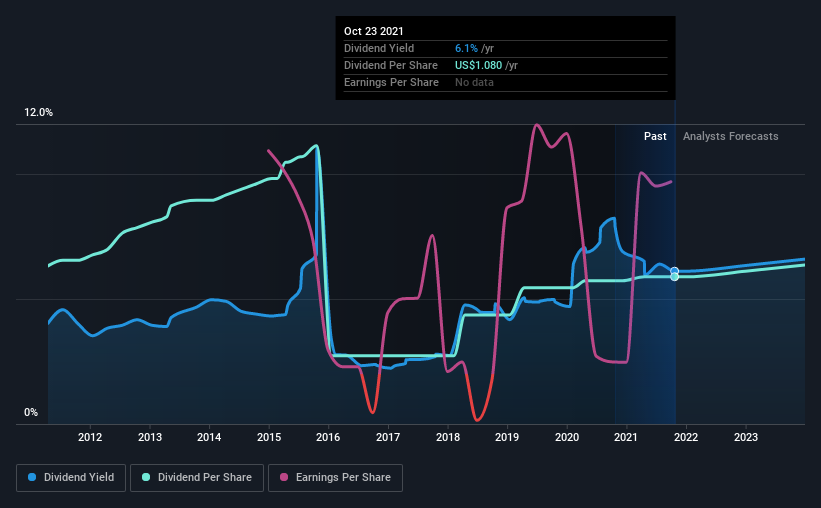Income Investors Should Know That Kinder Morgan, Inc. (NYSE:KMI) Goes Ex-Dividend Soon
Kinder Morgan, Inc. (NYSE:KMI) stock is about to trade ex-dividend in three days. The ex-dividend date is one business day before a company's record date, which is the date on which the company determines which shareholders are entitled to receive a dividend. It is important to be aware of the ex-dividend date because any trade on the stock needs to have been settled on or before the record date. Therefore, if you purchase Kinder Morgan's shares on or after the 29th of October, you won't be eligible to receive the dividend, when it is paid on the 15th of November.
The company's next dividend payment will be US$0.27 per share, on the back of last year when the company paid a total of US$1.08 to shareholders. Last year's total dividend payments show that Kinder Morgan has a trailing yield of 6.1% on the current share price of $17.67. If you buy this business for its dividend, you should have an idea of whether Kinder Morgan's dividend is reliable and sustainable. We need to see whether the dividend is covered by earnings and if it's growing.
Check out our latest analysis for Kinder Morgan
If a company pays out more in dividends than it earned, then the dividend might become unsustainable - hardly an ideal situation. Kinder Morgan distributed an unsustainably high 139% of its profit as dividends to shareholders last year. Without more sustainable payment behaviour, the dividend looks precarious. Yet cash flow is typically more important than profit for assessing dividend sustainability, so we should always check if the company generated enough cash to afford its dividend. It paid out more than half (56%) of its free cash flow in the past year, which is within an average range for most companies.
It's disappointing to see that the dividend was not covered by profits, but cash is more important from a dividend sustainability perspective, and Kinder Morgan fortunately did generate enough cash to fund its dividend. Still, if the company repeatedly paid a dividend greater than its profits, we'd be concerned. Very few companies are able to sustainably pay dividends larger than their reported earnings.
Click here to see the company's payout ratio, plus analyst estimates of its future dividends.
Have Earnings And Dividends Been Growing?
Stocks in companies that generate sustainable earnings growth often make the best dividend prospects, as it is easier to lift the dividend when earnings are rising. If earnings fall far enough, the company could be forced to cut its dividend. It's encouraging to see Kinder Morgan has grown its earnings rapidly, up 52% a year for the past five years.
Many investors will assess a company's dividend performance by evaluating how much the dividend payments have changed over time. Kinder Morgan's dividend payments per share have declined at 0.7% per year on average over the past 10 years, which is uninspiring.
Final Takeaway
Is Kinder Morgan an attractive dividend stock, or better left on the shelf? Kinder Morgan has been growing its earnings per share nicely, although judging by the difference between its profit and cashflow payout ratios, the company might have reported some write-offs over the last year. It might be worth researching if the company is reinvesting in growth projects that could grow earnings and dividends in the future, but for now we're not all that optimistic on its dividend prospects.
With that being said, if dividends aren't your biggest concern with Kinder Morgan, you should know about the other risks facing this business. For example, Kinder Morgan has 4 warning signs (and 2 which are a bit unpleasant) we think you should know about.
We wouldn't recommend just buying the first dividend stock you see, though. Here's a list of interesting dividend stocks with a greater than 2% yield and an upcoming dividend.
This article by Simply Wall St is general in nature. We provide commentary based on historical data and analyst forecasts only using an unbiased methodology and our articles are not intended to be financial advice. It does not constitute a recommendation to buy or sell any stock, and does not take account of your objectives, or your financial situation. We aim to bring you long-term focused analysis driven by fundamental data. Note that our analysis may not factor in the latest price-sensitive company announcements or qualitative material. Simply Wall St has no position in any stocks mentioned.
Have feedback on this article? Concerned about the content? Get in touch with us directly. Alternatively, email editorial-team (at) simplywallst.com.


